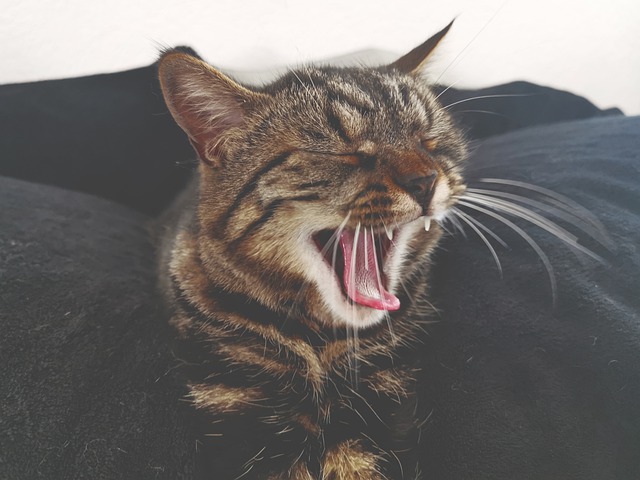A cat’s mating seasons is always a trying moment for both the kitty and the pet parent. Cats literally go out of their minds during this time—they have to deal with anxiety, excitement, and many other similar emotions. On the other hand, the owner may have to cope up with excessive vocalization, pacing, rolling on the floor, rubbing against people and objects, and spraying (which is always gross as it sounds).
Since cats often seem uncomfortable during this period, it is natural for a responsible pet parent to want to look for ways to calm their kitties down. Fortunately, there are many effective remedies that are natural and easy to administer. And one remedy that many cat owners vouch for is the use of herbs. Herbs are not only effective but are also healthy and you don’t have to break the bank to purchase them either.
Without further ado, here is a quick overview of the top 17 herbs that can help you reduce your feline friend’s stress and anxiety when she’s in heat.
1. Catnip
Nepeta cataria, catmint, catswort, or catnip is one of the approximately 250 species of herbs in the mint family. It contains an active compound, nepetalactone, which is known to get cats high when they inhale it—whether from live and dried leaves/stems or oil extracts. The euphoric effects of the plant occur when nepetalactone activates the cat’s olfactory system.
Essentially, the compound binds to the cat’s accessory olfactory receptors and in turn stimulates sensory neurons leading into the cat’s brain. This then alters the activity of various parts of the brain, including the olfactory bulb, amygdala, and hypothalamus. The hypothalamus plays a critical role in regulating emotions in animals.
Most cats react to catnip by pacing, rolling, rubbing, flipping, and eventually zoning out. Some may also growl and meow at the same time. Other cats may also become aggressive and hyperactive.
But these effects make catnip seem more like a stimulant than a relaxant? You are right! The herb is more popular as a stimulant. However, the high energy that your feline friend experiences after consuming this plant often wear off fast , making way for an exhausted nap—and that’s where it comes in handy in calming your kitty’s estrus emotions.
There are a few tips that you should always keep in mind when you decide to calm your kitty with catnip, including:
- Some cats don’t respond to catnip because they lack the ‘catnip gene’. So, only opt to use the herb to calm your kitty in heat if you’ve previously given her the herb and you know how to anticipate her reaction.
- Organic, dried catnip is better than other store-bought options. Its effect is more intense and it is less likely to cause gastrointestinal problems to your cat.
- Some of the best ways of giving catnip to your feline friend include sprinkling it on her food, stuffing it in her favorite toys, or sprinkling it around areas she loves to hang out.
- Give catnip to your cat in moderation as large quantities of the herb (or any garden mint variety) may cause diarrhea and vomiting in cats.
2. Bach Rescue Remedy
Another herbal remedy that you can use to make your cat feel better during her heat periods is Bach Rescue Remedy, a blend of five flower essences. For starters, flower essences are basically liquid tinctures formulated from a variety of flowers with stress-relieving properties. Unlike tinctures made for humans, Bach Rescue Remedy and other tinctures made specifically for pets are formulated with food-grade vegetable glycerin, making them safer for pets’ consumption. If your fur baby is yowling, rolling on the floor, and manifesting other funny symptoms of being in heat, this alcohol-free tincture will not only ease her stress but also boost her immune system.
Put a few drops of the tincture on your hand and rub on your kitty’s head and ears. Alternatively, put a drop on your finger and touch your queen’s lips. Another easy method of administration is spraying (using a spray bottle) some tincture around the house or areas frequented by your kitty.
3. Chamomile
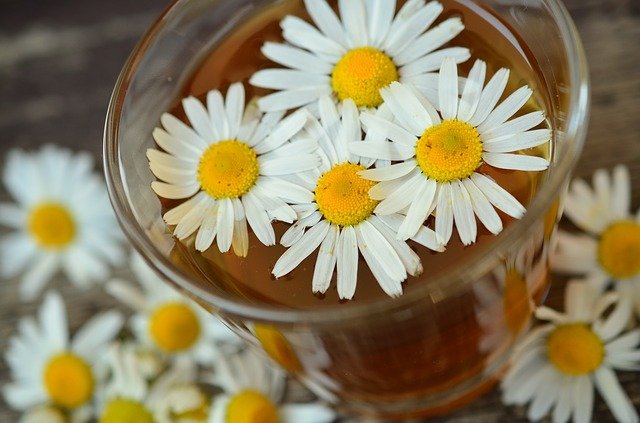
Chamomile is an herb that has long been consumed as a natural remedy for anxiety and upset stomach. It has potent anti-inflammatory, anti-spasmodic, and muscle-relaxing properties in humans. Studies done on animals have also shown that the herb contains active ingredients that stimulate the same parts of the brain and nervous system as anti-anxiety drugs. It is, therefore, capable of inducing relaxation and reducing feelings of stress in your cat.
You should be cautious when giving it to your kitty, though, because cats need it in much smaller doses than do dogs and humans. Here are a few factors to keep in mind when you opt to calm your cat in heat using Chamomile:
- The best way of getting all the benefits of the herb without potential side effects like indigestion is by giving your kitty dried chamomile flowers. We don’t recommend that you allow your kitty to eat or chew on the plant because the oils coming from the plant leaves and stems are concentrated and it is difficult to tell how much your cat has ingested. Feeding your cat fresh Chamomile plant can cause detrimental health issues like diarrhea, vomiting, loss of appetite, and mouth irritation.
- Dried Chamomile is also safe for your kitty when brewed into tea and fed in small amounts. Give around ½ tablespoon to an average-sized cat.
- Liquid extract is also excellent in relieving anxiety in cats but should be given in MUCH smaller amounts.
- A light spritz of hydrosols (condensed steam from Chamomile oil) in the air is also great for calming your kitty’s nerves.
4. Valerian
Valerian root has been used for years as a remedy for anxiety, insomnia, and high blood pressure in humans, thanks to its potential to increase the levels of Gamma-aminobutyric acid (GABA) in the brain. In cats, the herb has opposite effects, often causing hyper-excitability behaviors similar to those seen when they consume catnip. Its active ingredients, terpenoids, often cause cats exposed to it to roll around, play and act excited—just like felines exposed to catnip. However, it has a different aftermath—it makes your cat fall asleep faster and it is stronger than catnip in the initial hyperactivity phase.
Like catnip, some cats may not show any reaction when exposed to Valerian. It may also make your kitty act more aggressive and unpredictable than usual. Accordingly, keep a close eye on your kitty the first few times you give her the Valerian root.
There are many brands of cat toys that are filled with Valerian root. Consider getting your kitty one of these to calm her during her estrus days. Alternatively, sprinkle dried, finely minced root of the herb on your cat food. (Ensure that the dried roots are cut into very smaller pieces so they aren’t a choking hazard to your kitty). And avoid Valerian supplements, pills, and tinctures made for humans as they might be too strong or concentrated for your kitty.
5. Ginseng
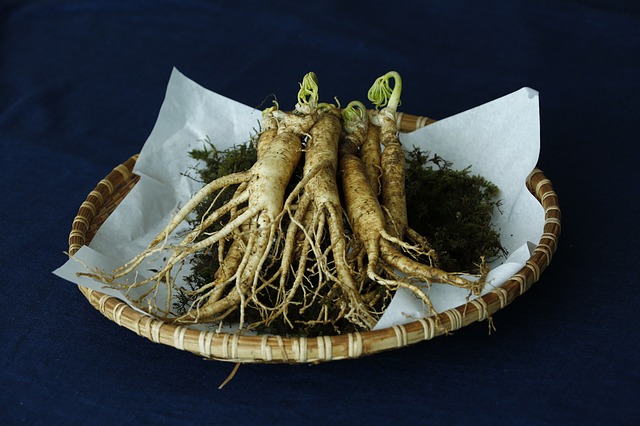
Ginseng is a popular herbal supplement that comes from the root of various plant species in the Panax genus. It is often used as tea to calm nerves and relieve stress. It is also believed to boost energy, promote relaxation, reduce stress, lower cholesterol levels, and treat diabetes in humans. Many cat owners also find it useful for calming felines. Besides, there are no known side effects of the herb in cats. You can administer (albeit in moderation) the herb whole and fresh, dried, in tinctures and capsules.
There are three varieties of Ginseng: American (Panax quinquefolius), Asian (Panax ginseng), and Siberian (Eleutherococcus senticosus). Only the first two are recommended for pets because the latter is not actually Ginseng—a Russian scientist has been accused of falsely promoting it in a bid to woo people to believe that it has identical effects as the American and Asian varieties. Because of the existence of questionable varieties, seek your vet’s advice before using the herb.
6. Ashwagandha
Ashwagandha (Withania Somnifera Dunal) is an Ayurvedic herb that has been used for centuries by Indian natives to promote health and wellbeing. Scientifically, it contains a wide range of therapeutic constituents (withanolides, sitoindosides, and a host of other alkaloids) that are known to reduce anxiety, stress, and unwanted inflammation. It is believed to produce similar effects in felines—it reduces stress and normalizes kitties’ body and mind. It is also useful in combating bacteria and inflammatory issues in cats. You can either give your cat the whole herb, its dried extract, or tincture. Dosage varies with your cat’s weight, so consult your vet to help establish the exact dosage that’s appropriate for your fur baby.
7. Lemon Balm
Lemon balm (Melissa officinalis) contains, among other compounds, flavonoids, volatile oils, and tannins. These compounds give the herb a number of potent therapeutic properties, including anti-viral, anti-bacterial, pain-relieving, calming, and muscle-relaxing effects. The herb is also believed to slow down anoveractive thyroid—a common problem in cats—by inhibiting the uptake of thyroid-stimulating hormone (TSH) at TSH receptors.
8. Passion Flower
Passionflower (Passiflora Incarnata) has long been used by the ancient Aztecs as calming sedative and pain reliever. Today, it is used as a natural calming remedy and as a sleeping aid due to its ability to relax the body and mind. The same properties that relax, calm, and help induce sleep in humans are believed to be effective in felines.
In particular, it increases aminobutyric acid levels in the cat’s brain, which lowers the activity of certain brain cells. This in turn puts the body of your cat in a calm and relaxed state. The herb is also believed to boost the levels of serotonin and dopamine in pets’ bodies. High levels of the two neurotransmitters are known to calm and boost moods in pets.
To relieve your cat from the troubles of estrus hormones, give her a few drops of this sleep-inducing tincture by mouth.
9. Skullcap
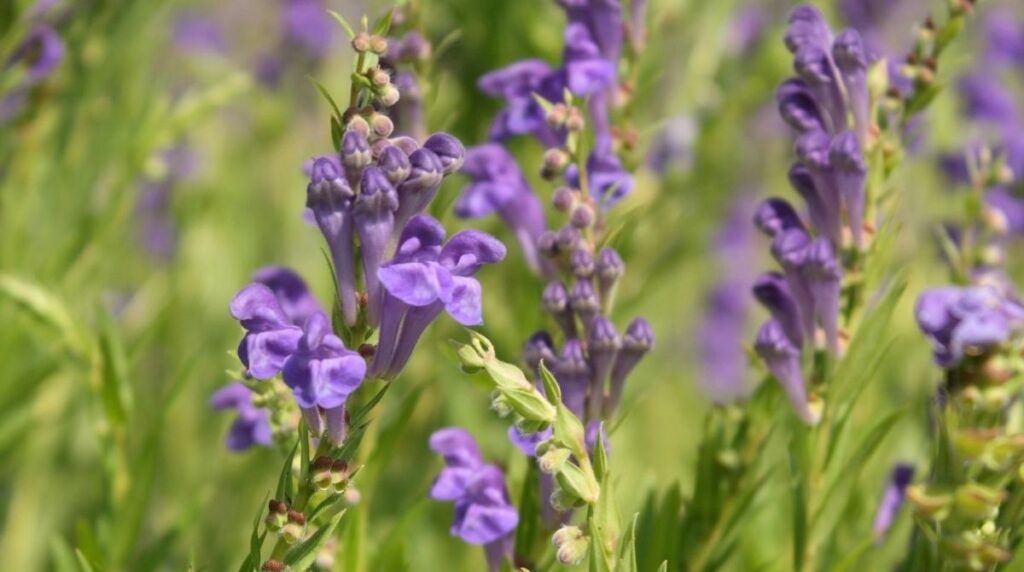
This is a perennial plant native to the North American regions. The dried leaves and stems of the plant have been used for centuries by Native Americans to treat anxiety, stress, insomnia, and a host of other conditions including digestive and kidney issues, menstrual disorders, and nervousness.
It is believed to provide antispasmodic relief in cats, calming them down and helping get them to sleep. The herb is frequently used as an alternative to valerian. But unlike valerian, skullcap does not interfere with motor coordination, cause drowsiness or slow down reflexes.
There are many varieties of skullcaps (of course, with varying chemistries). So, when you decide to calm your cat in heat with this herb, opt for Scutellarialaterifolia (the primary commercial species in North America).
10. California Poppy
Another herb to consider when your cat is experiencing discomforts of heat cycle is the California poppy. While the Poppy name brings to mind opiates like heroin, the California species (Eschscholzia californica) doesn’t contain opiates. Instead, it has very mild opiate-like properties, which make it useful for bringing calming effects in agitated felines.
So, giving your cat a small dose when he is in heat will not make her completely nod out. Instead, she will be relieved from anxiety, tension, and other strange symptoms associated with the estrus cycle. When you decide to use this herb to calm your kitty, use very small frequent dosages—about 0.25 ml of the poppy tincture—once every two hours until she achieves a restful state.
11. Kava
Kava or kava-kava is another excellent herb that can offer relief to your kitty’s heat cycle woes. Derived from the roots of Piper methysticum, a type of plant native to Pacific Island, its extracts have been utilized as muscle relaxer and sedative for several years by the native Polynesian cultures. While there are still no controlled studies of its use in pets, it has been recommended as a potent sedative, anxiety reliever, and sleep aid in cats. Avoid combining it with other anti-anxiety drugs or giving it to your cat if she has a liver disorder.
12. Vetiver
Vetiver is a clumpy, aromatic grass native to India and belongs to the same botanical family as citronella and lemongrass. It has a soothing effect and may help with anxiety. In a past study carried on rats, the subjects of the study appeared more relaxed after being exposed to Vetiver oil.
13. Cat Thyme

Cat Thyme is a perennial evergreen herb in the mint family, Lamiaceae. It is commonly used for medicinal, culinary, and ornamental purposes. It is considered to be a better alternative for cats that don’t respond to catnip. It offers similar soothing effects as catnip plus additional feelings of contentment. The only downside of the thyme is its rancid odor.
While it is considered by ASPCA and FDA as safe for pets, it is important to introduce the herb to your feline in incremental amounts. Start serving your cat small amounts of thyme and see how she responds before adding her more. Like any other herb, commercial thyme also comes with usage instructions, which you should follow to ensure your kitty’s safety.
14. Sweet Basil
Another member of the mint family, sweet basil is a popular aromatic herb commonly used in teas and supplements to provide a wide range of health benefits. It is commonly used as a remedy for tummy issues, including diarrhea, constipation, spasms, and loss of appetite. In felines, it is also believed to prevent cellular damage, relieve anxiety, and ease pain. It is, therefore, another potential herb you can try out when looking for a natural remedy to help you calm your kitty in heat.
15. Hops
The dried, flowering parts of the Hops plant (Humulus lupulus) has long been used as an herbal medicine for relieving nervousness (a calmative and a sleep aid) and as an aromatic bitter for aiding digestion and boosting appetite. In pets, it is believed to produce non-drug induced sleep, calm nerves, and relax excited cerebral conditions. It also famed for its antibiotic properties.
16. Clary Sage
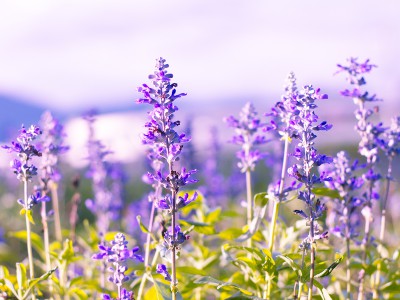
Clary sage or (Salvia sclarea) is a flowering shrub native to the Mediterranean Basin and very popular for its relaxing and refreshing smell. It is characterized by woody stems, grayish leaves, and flowers that range from blue to purplish.
The herb has potent, astringent, antiseptic, antihydrotic, and antispasmodic qualities. The latter property is believed to help calm felines’ muscles, preventing muscle twitching, seizures, and body tremors. It is also a great vasodilator, which means that it can relax the muscles of your feline blood vessels, promoting smooth blood circulation and keeping your cat’s heart healthy.
17. Kratom
Kratom or Mitragyna speciosa is a tropical tree native to Southeast Asia, with leaves that contain compounds (medicinal alkaloids) that produce psychotropic (mind-altering) effects. The plant has been used in ancient medicine for boosting appetite and relieving anxiety. Many cat owners believe that it produces similar results in our feline friends. It is also believed to offer cats several other benefits like relieving pain and inflammation in elderly cats and helping felines deal with joint issues.
Final Thoughts
There you have it; 17 of the best, readily-available herbal remedies for cats in heat. Like herbal remedies for humans, there no single herb on our list that works on every cat. Your kitty may not respond totally to some of the herbs. When you opt to calm your kitty in heat using herbal remedies, therefore, it is essential to be patient and to try different herbs until you find one that works for your feline friend.
Don’t let your fur baby notice your frustration, anger, or discontent with her behavior during this periods as this will only aggravate her stress. Be optimistic and you’ll soon find a solution to your cat’s estrus-induced discomforts.
And don’t forget to always talk with your vet or holistic vet, especially if the worrying symptoms persist after administering the highlighted herbs. A vet will also help you establish the proper dosages of these herbs and whether they are appropriate for your kitty.
Related Posts:
How to Stop a Cat in Heat from Meowing (9 Simple Ways)
Essential Oils for Cats in Heat
How Long Does a Male Cat Stay in Heat?
Do Cats Get Pregnant Every Time They Mate?

Hi! I am Eleanor Price. I started this website after my cat, Louie, almost died from a case of botulism (a type of food poisoning often caused by bacteria that grow on food items). Turned out that my cat’s diet was the problem. I have made it my duty to provide the best information and recommendations about everything cat lovers need to know about their felines’ health and wellbeing. My goal is to find the most informative content on anything feline-related and share it with fellow hardworking kitty lovers.

